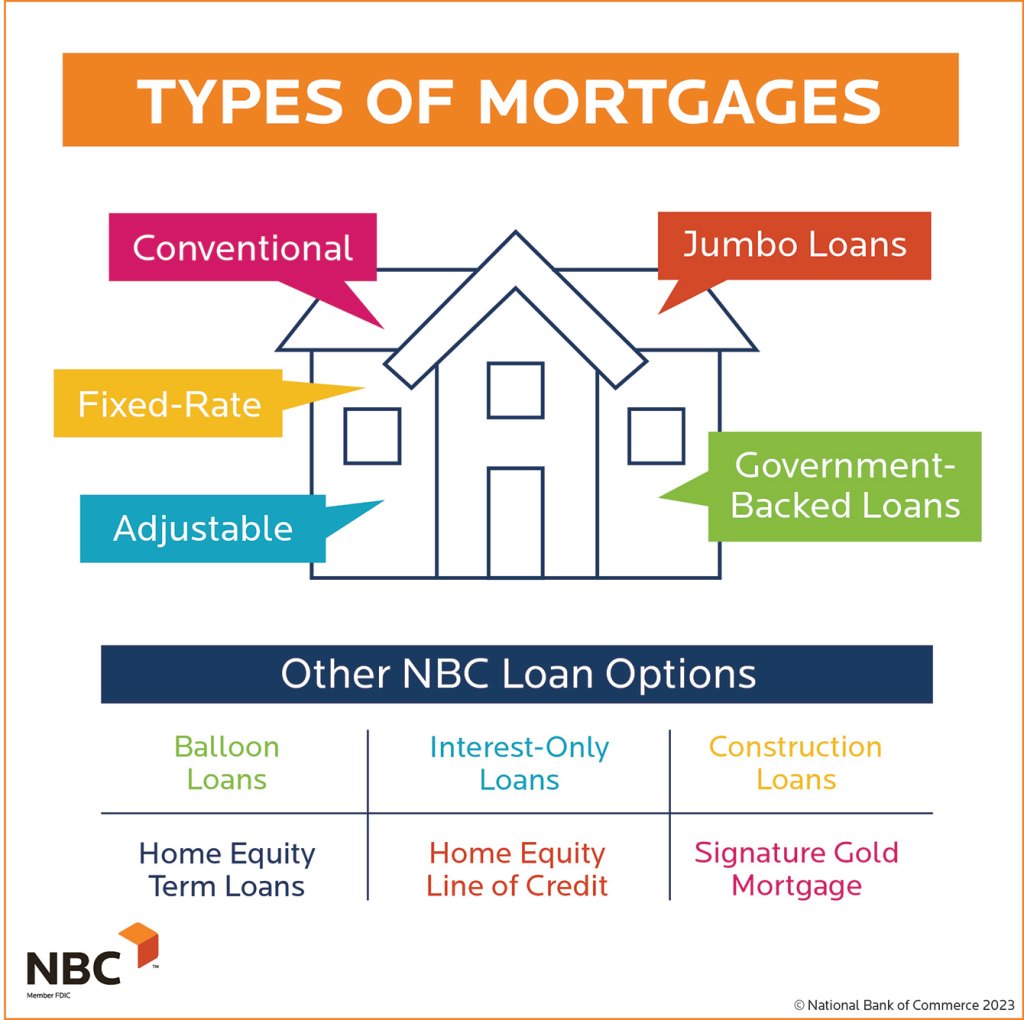A Comprehensive Guide to Home Loans: Services and Options Explained
Charting the globe of mortgage can be intricate. Different choices exist, each with distinct attributes and implications for possible homeowners. Understanding the differences in between traditional and government-backed car loans is essential. The application process involves careful documents and pre-approval steps that lots of neglect. As debtors begin on their home-buying journey, recognizing just how to manage these responsibilities properly can indicate the distinction in between economic stability and difficulty. What methods can empower them on this path?
Understanding Home Loans: Types and Terminology
Comprehending the different kinds of mortgage and their linked terms is essential for potential home owners, as it outfits them with the knowledge needed to make informed financial choices. Mortgage can be broadly classified right into adjustable-rate and fixed-rate home mortgages. Fixed-rate mortgages maintain a constant rates of interest over the life of the loan, offering security in monthly repayments. Fast Cash. Alternatively, variable-rate mortgages include rates of interest that may rise and fall after an initial set duration, potentially leading to reduced first payments but increased future expenses
Additional terminology is essential for quality. Principal refers to the funding quantity obtained, while rate of interest is the expense of loaning that amount. The regard to the loan suggests its duration, commonly ranging from 15 to 30 years. Understanding these basic principles allows prospective customers to navigate the complex landscape of home financing, ensuring they choose the appropriate funding alternative that straightens with their financial circumstance and long-lasting objectives.
Standard Finances vs. Government-Backed Loans
A considerable distinction in home funding exists between standard finances and government-backed fundings, each satisfying different debtor needs and conditions. Standard finances are not insured or ensured by the federal government and commonly require higher credit report and down payments. They are usually appealing to debtors with secure financial backgrounds, as they may use affordable rates of interest and terms.
In contrast, government-backed lendings, such as FHA, VA, and USDA finances, are developed to help certain teams of debtors, including newbie buyers and veterans. Cash Loans. These lendings usually feature reduced down settlement needs and more flexible credit history requirements, making them obtainable to a broader range of people
Inevitably, the selection in between government-backed and traditional loans depends upon the borrower's monetary circumstance, long-term objectives, and eligibility, making it necessary to very carefully examine both options before deciding.

The Function of Rates Of Interest in Home Funding
Rate of interest rates play an essential duty in home financing, affecting consumers' decisions in between set and variable price loans. The option between these choices can considerably impact month-to-month payments, affecting general affordability. Understanding exactly how rate of interest operate is crucial for anyone maneuvering with the mortgage procedure.
Fixed vs. Variable Prices
Buyers encounter a necessary choice when choosing between fixed and variable rates, as this selection greatly affects the price of financing in time. Fixed-rate mortgages provide stability, securing a rates of interest for the life of the funding, which can be beneficial in a rising rate of interest atmosphere. This predictability permits homeowners to spending plan extra successfully. Conversely, variable-rate mortgages, or variable-rate mortgages (ARMs), usually begin with lower initial rates that can change based on market conditions. While this might lead to reduced preliminary payments, customers encounter the risk of raised prices in the future. Eventually, the choice in between fixed and variable prices depends upon individual monetary scenarios, risk resistance, and assumptions concerning future rates of interest patterns.
Effect On Regular Monthly Payments
When evaluating home funding alternatives, the impact of rate of interest on regular monthly repayments is a key element to consider. Rates of interest straight influence the total price of borrowing, affecting just how much a consumer will pay each month. A lower interest rate lead to smaller sized monthly repayments, making homeownership more cost effective. On the other hand, higher rates can considerably increase regular monthly obligations, possibly straining a property owner's spending plan. Additionally, the lending term plays an essential role; longer terms may spread out repayments out however can lead to paying even more passion in time. Understanding how rate of interest interact with finance amounts and terms is necessary for customers to make educated financial choices and choose a home loan that aligns with their lasting economic goals.
Home Mortgage Brokers vs. Direct Lenders: Which Is Right for You?
When taking into consideration a home mortgage, prospective customers have to recognize the unique roles and obligations of home mortgage brokers and straight loan providers. Each alternative presents its very own benefits and drawbacks, which can substantially affect the overall cost of financing. An enlightened choice needs mindful evaluation of these aspects to establish the best suitable for private needs.
Roles and Responsibilities Specified
Steering the complexities of home funding needs a clear understanding of the duties and obligations of mortgage brokers and straight lenders. Mortgage brokers act as middlemans, linking borrowers with loan providers. They examine a borrower's financial scenario, curate funding alternatives, and overview clients via the application process, commonly leveraging multiple lending institution connections to protect favorable terms. On the other hand, straight lending institutions, such as banks and lending institution, supply finances straight to customers. They manage the whole financing procedure, from application to financing, with a focus on their own products. Each option presents distinctive avenues for getting funding, making it crucial for borrowers to review their preferences and demands when deciding between involving a home mortgage broker or dealing with a direct lender.
Disadvantages and pros Comparison
Choosing in between a mortgage broker and a direct lender can substantially affect the home funding experience, as each choice uses special benefits and downsides. Home mortgage brokers work as middlemans, supplying accessibility to numerous loan providers and potentially better prices, while streamlining the loan procedure. However, they might charge fees and depend on commission frameworks that can influence their recommendations. On the various other hand, direct loan providers improve the process by using in-house fundings, which can result in quicker authorizations and fewer complications. Alternatively, they may have a minimal choice of products and less flexibility relating to rates. Eventually, the choice hinges on individual choices, economic circumstances, and the desired degree of assistance throughout the mortgage journey.
Price Effects Analyzed
While reviewing the expense effects of mortgage brokers versus direct lending institutions, possible homeowners should consider various elements that can considerably impact their total costs. Home loan brokers normally charge fees for their services, which can vary considerably, influencing the total funding expense. Nonetheless, they usually have access to a larger variety of lending items and competitive rates, potentially conserving borrowers money over time. Alternatively, straight loan providers may use a more simple process with potentially reduced in advance prices, however their car loan choices may be limited. It is vital for homeowners to compare rate of interest prices, charges, and terms from both brokers and lending institutions, ensuring they make an educated decision that lines up with their monetary goals and demands.
The Home Lending Application Refine: What to Anticipate

The home mortgage application process can frequently feel frightening for several candidates. It commonly begins with gathering essential paperwork, including proof of earnings, credit rating, and personal identification. Lenders utilize this info to analyze official website the candidate's financial stability and establish financing eligibility.
Next off, applicants send a formal application, which may include filling in on-line kinds or giving details personally. Throughout this stage, loan providers review different elements, such as debt-to-income proportion and credit rating, to select loan terms.
As soon as pre-approved, the loan provider will carry out a detailed assessment of the home to identify its worth straightens with the financing quantity. This stage might also consist of added background checks.

After last authorizations and conditions are satisfied, the loan is processed, bring about the closing phase. Recognizing each step equips candidates, making the journey smoother and extra convenient as they relocate toward homeownership.
Tips for Managing Your Home Mortgage Properly
Successfully maneuvering the mortgage application process is simply the beginning of an accountable economic journey. Managing a home financing requires attention to a number of essential practices. Initially, customers must establish a clear budget plan that fits regular monthly home mortgage settlements, residential or commercial property tax obligations, and insurance policy. Regularly evaluating this spending plan helps avoid overspending and warranties prompt payments.
Additionally, making additional payments when feasible can significantly lower the loan principal and overall interest paid with time. Consumers should also keep open lines of interaction with their loan provider, especially in times of economic problem. This can lead to potential services such as financing adjustments or refinancing alternatives.
It is a good idea to keep an eye Click This Link on debt scores regularly. A great credit rating score can supply possibilities for far better loan terms in the future. Cash Loans. By following these pointers, house owners can navigate their loan duties successfully, guaranteeing long-term economic wellness and security
Frequently Asked Questions
What Are Closing Prices and How Are They Determined?
Closing expenses encompass fees associated with settling a home mortgage, consisting of assessment, title insurance policy, and lending origination charges. These prices usually range from 2% to 5% of the funding quantity, varying based upon area and lending institution.
Can I Qualify for a Home Financing With Bad Credit Score?
Yes, individuals with bad credit history can get a home financing, though choices might be restricted. Lenders commonly call for higher down repayments or rates of interest, and checking out government-backed fundings might enhance possibilities of authorization.
What Is Home mortgage Insurance and When Is It Needed?
When a consumer makes a down repayment of less than 20%, home mortgage insurance coverage protects lending institutions versus default and is usually needed. It guarantees that lending institutions recover losses if the consumer fails to repay the lending.
How Does Refinancing Job and When Should I Consider It?
Refinancing entails changing a present home loan with a brand-new one, generally to secure a reduced interest rate or change finance terms. Property owners need to take into consideration re-financing when interest rates drop significantly or their financial scenario enhances.
What Occurs if I Miss a Home Mortgage Repayment?
If a home loan repayment is missed out on, the loan provider typically assesses late charges, reports the misbehavior to debt bureaus, and may initiate foreclosure proceedings if settlements remain to be overlooked, ultimately endangering the house owner's property.
Fixed-rate home mortgages preserve a regular interest price over the life of the loan, providing stability in regular monthly payments. A significant distinction in home funding exists between he said traditional car loans and government-backed financings, each providing to different debtor needs and scenarios. In comparison, government-backed fundings, such as FHA, VA, and USDA loans, are made to help certain groups of borrowers, consisting of first-time buyers and experts. Rate of interest prices play an important role in home funding, affecting consumers' choices between variable and fixed rate fundings. Fixed-rate home mortgages offer stability, securing in an interest rate for the life of the loan, which can be useful in a climbing passion price environment.